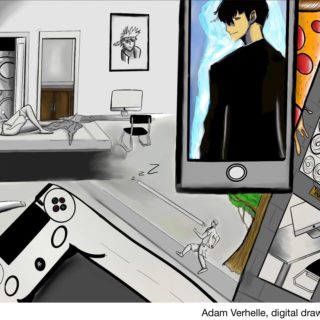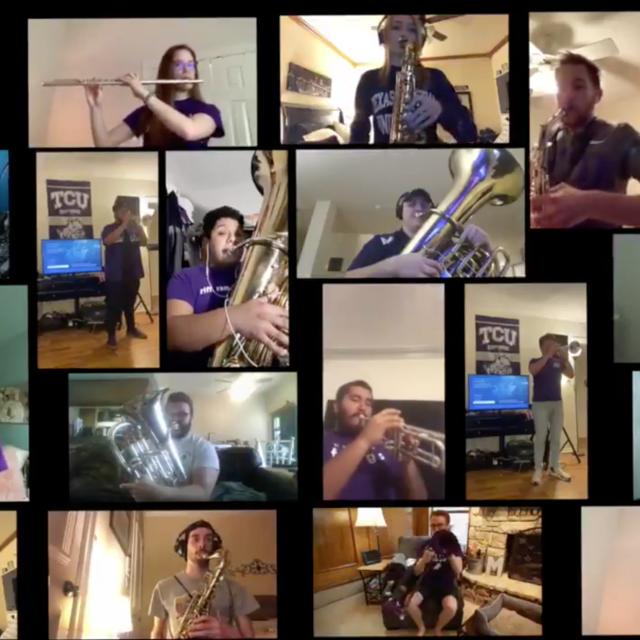When the global pandemic caused TCU to extend spring break and move classes to virtual instruction for the spring semester, faculty and staff moved swiftly to ensure continuity for all TCU students. Creativity abounded, and the result – student success stories and memorable moments that Horned Frogs will never forget.
Share your stories of virtual creativity and success with us at TCU Today.
Connecting through creativity
Roxo, the TCU student-run advertising and public relations agency in the Bob Schieffer College of Communication, literally came together to promote staying apart. A team developed a social media ad campaign to promote responsible health and social distancing. In another area, TCU News Now, the student broadcast team learned on their feet. The team quickly discovered a new skill — reporting remotely from their homes — and engaged their inner creativity to discover stories to tell while under stay-at-home orders.

The students in the College of Fine Arts were forced to think outside the box in order to present—amidst a social distancing semester—projects that normally require an audience. They rose to the challenge. A project titled “Quarantine Panorama” allowed fine art students to create a piece that documented how their lives changed during quarantine. A look into each other’s worlds connected students in an unexpected way. And creativity was stretched when a music student saw his choral composition come to life via an unprecedented-for-TCU virtual performance.
Bonding through service
Samantha Singer, graduate student in developmental trauma, was determined to help the vulnerable during stay-at-home orders. In the College of Science & Engineering, Singer stepped into action and led a team of child development students to write letters to staff members serving abused children of both CASA of Tarrant County and Alliance for Children. The gesture of support was not only appreciated by the recipients, but also was a hands-on lesson and connection-builder for students.
The Neeley School of Business answered the call from students who wanted to collectively make a difference during the coronavirus outbreak. The answer came in the form of a “hackathon,” where students worked together virtually for a week-long Horned Frog Brain Hack. The teamwork centered on the shortage of mental health workers needed to aid the more than 50 percent of the population predicted to have depression, anxiety or post-traumatic stress disorder as a result of the COVID-19 pandemic.
A class that focuses on volunteering in the community would seem doomed under the semester’s surprising turn of events, but not in AddRan College of Liberal Arts. The instructor of Service Learning in the Latino Community, together with the Koehler Center for Instruction, Innovation & Engagement, developed curriculum where each week students read an essay, poem or historical text in Spanish and then delved into how the authors’ ideas reflect service, keeping the focus on service impact.
A shift in strategy
While some colleges succeeded in transitioning to online learning in record time, the Intensive English Program in the School of Interdisciplinary Studies was already at work on Zoom and other avenues, educating students all over the world. Due to economic and political conditions through the years, the program was already “teleclassrooming” on three continents as the pandemic hit the U.S. As other universities moved to add the remote component, IEP was positioned to quickly augment the program, reaching students on six continents as of this writing.
In the College of Education, it was fitting that Brooklyn Baldwin presented her project virtually for the 2020 Research & Pedagogy Festival. After all, her winning research investigated how interaction varies from online instruction to face-to-face instruction, and the pandemic provided her a whole new perspective on her own research. Education students were exposed not only to learning in an online environment, but also to educating in one, as its laboratory schools Starpoint and KinderFrogs went virtual and experienced success through events like virtual morning parent “coffees.”
Ironically, a casualty of the global health crisis was that many nursing students were moved out of hospitals. Not in TCU’s Rural Health Initiative. While many of the major city health systems did not allow the presence of students during the COVID-19 outbreak, rural hospitals welcomed them. TCU’s partnership with 31 rural hospitals in Texas enabled Harris College of Nursing & Health Sciences to send additional graduate students in the Family Nurse Practitioner program to rural areas to complete their clinical hours, providing valuable care to patients and critical experience to students.
Zoom meetings engaged students in the Cultural Memory course, allowing for the same animated discussions that students experienced in the John V. Roach Honors College class. The professor hosted a “Cultural Memory Clubhouse,” described as an “optional but lively check-in” where students could touch base on their lives, concerns and this crazy time in history. After all, the purpose of the course is to examine how society interprets and remembers monumental events. This time, they were living one. And they were doing it apart, but together.
